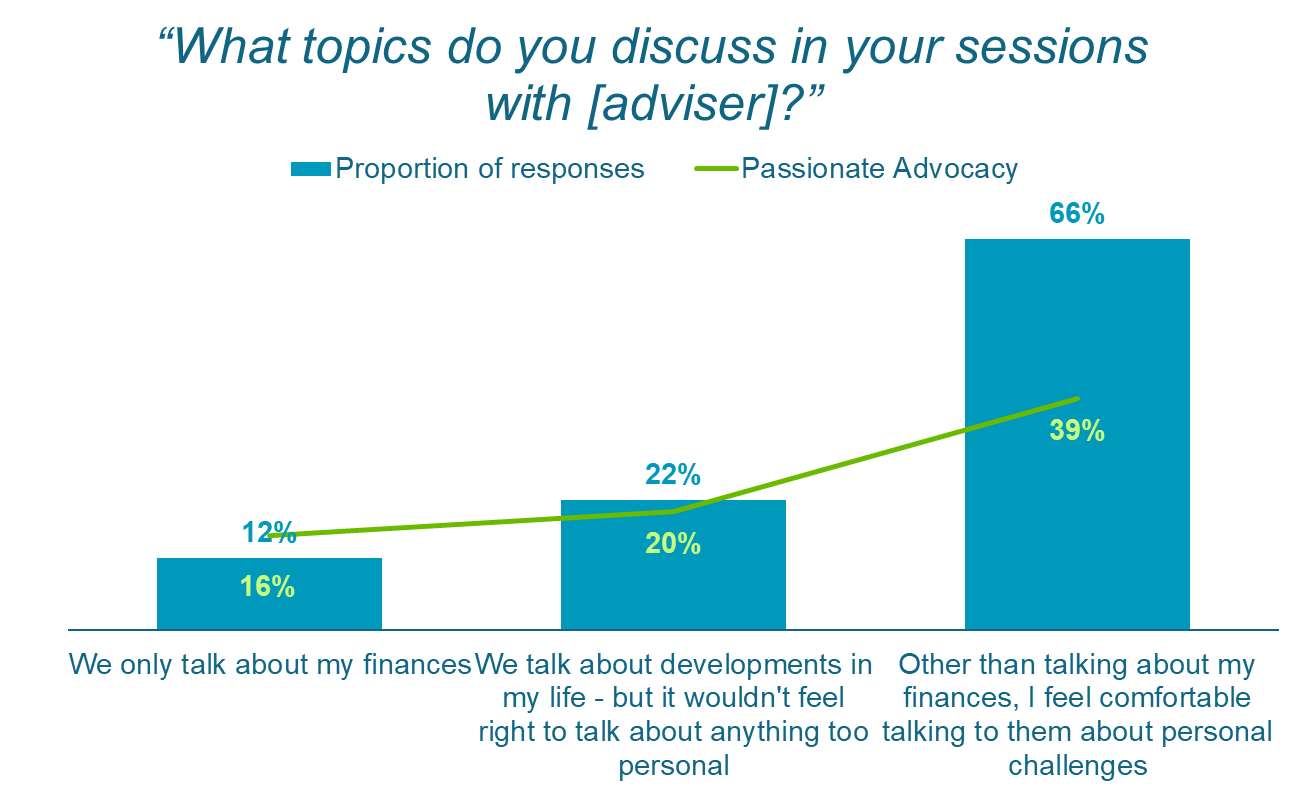Trust And Rapport
Trust And Rapport is a Driver of Elevation Goal 2: Delighting existing clients, promoting advocacy and retention
Data based on responses to the following question, asked in the Verified Client review form
“What topics do you discuss in your sessions with [adviser]?”
Possible responses
- We only talk about my finances
- We talk about developments in my life - but it wouldn’t feel right to talk about anything too personal other than finances
- Other than talking about my finances, I feel comfortable talking to them about personal challenges (e.g. bereavement, health issues, relationship difficulties…)
Trust And Rapport Score
Proportion of respondents answering “Other than talking about my finances, I feel comfortable talking to them about personal challenges (e.g. bereavement, health issues, relationship difficulties…)”
Relationship between Trust And Rapport and Passionate Advocacy
The relationship between Trust and Rapport and Passionate Advocacy is highly statistically significant

The impact of Trust and Rapport on advocacy arose repeatedly through our qualitative research with firm management teams, advisers and consumers.
Based on our data, asking clients direct questions about whether they trust, or have a good rapport with their adviser tend to yield near-universally positive results, offering limited value to identify areas for improvement.
Through our consumer research, we noted that clients with the strongest trust of and rapport with their adviser would be comfortable sharing personal challenges with them, so we ask clients a question on this, as an indicator of the underlying trust and rapport.
We confirmed the relationship between this question and passionate advocacy quantitatively through our review forms.
How to improve your score:
Starting your conversations
Beware starting your conversation with money. This can be an immediate turn off for your prospective clients and risks a superficial conversation preventing you from understanding your client’s real motivation.
Sincerity is key. Ask your client how they are and be genuinely interested in their response. Asking how someone is and then saying “great, so let’s get on with things” shows your question was insincere, killing rapport.
Make it personal
Events and milestones. Make a note of key events (ideally in your CRM system) and ask your client about them the next time you speak to them.
Touching base. Set a reminder/diary note for you to contact them around special events (retirement, child’s graduation, amazing holiday). Give them a call specifically to ask about the event – don’t talk about business at all in the call.
Active listening. Being conscious of your behaviour and body language when your client is talking. Active listening is a great way to show your client that you’re interested in what they have to say.
Be honest, be you
Own mistakes. Don’t try to cover them up. If you’ve forgotten to ask for something, it’s much better to be honest. People connect more with others who are able to show vulnerability so by being honest, you’re likely to build a deeper relationship with your client.
Be Open. Share some information about your life, including any challenges. We’re not talking about a full therapy session, however sharing shows you to be authentic. If your client feels that you’re being open about your life, they’ll feel more comfortable being open about theirs.
To give advice, you need to know the whole story. By being your true self, genuinely interested in your client’s life and remembering key events, you deepen your relationship with them. This leads to trust, them providing the information you need and a massive boost in client advocacy.

